Emil Zátopek (September 19, 1922 – November 22, 2000) was a Czech long-distance runner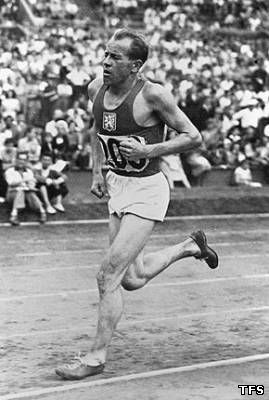 born in Kopřivnice, Czechoslovakia on September 19, 1922 who won three gold medals at the 1952 Summer Olympics in Helsinki. He won gold in the 5000 metres and 10,000 metres runs, but his final medal came when he decided at the last minute to compete in the first marathon of his life. He was nicknamed the "Czech Locomotive" for his multiple golds. born in Kopřivnice, Czechoslovakia on September 19, 1922 who won three gold medals at the 1952 Summer Olympics in Helsinki. He won gold in the 5000 metres and 10,000 metres runs, but his final medal came when he decided at the last minute to compete in the first marathon of his life. He was nicknamed the "Czech Locomotive" for his multiple golds.
Zátopek was the first athlete to break the 29-minute barrier in the 10 km run (in 1954). Three years earlier, in 1951, he had broken the hour for running 20 km. He is widely considered to be one of the greatest runners of the 20th century and was also known for his brutally tough training methods.
At the age of 16, he worked in a Batashoe factory in Zlín. At the time he had no interest in running but on one occasion was picked out to join a race; he says that "One day, the factory sports coach, who was very strict, pointed at four boys, including me, and ordered us to run in a race. I protested that I was weak and not fit to run, but the coach sent me for a physical examination, and the doctor said that I was perfectly well. So I had to run, and when I got started, I felt I wanted to win. But I only came in second. That was the way it started." He finished second out of 100 runners. This started his interest in running and within four years he was representing Czechoslovakia. In 1944, Emil broke the Czech records for 2,000, 3,000, and 5,000 meters. He was selected for the Czech national team for the 1946 European Championships and finished fifth in the 5K, breaking his own Czech record of 14:50.2, running 14:25.8. The second world war and German occupation of Czechoslovakia meant he lost the best years of his career, but in 1948, he became a household name winning the 10 Km in the austerity London Olympics, his second race at that distance. He also finished second in the 5Km. He won the 5 km and 10 km at the 1950 European Championships and the 10 km at the next European Championships.
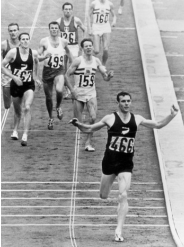 On 29 September 1951, the Zatopek ran 20 kilometers in one hour and broke four world records in one breathtaking race. By the end of 1953 he held eight world running records—the only man in history to hold so many records at the same time. He was the first many to run 20 Km in less than an hour. In total he set 18 world records. He set records in the 5 km (1954), 20 km (twice in 1951), one-hour run (twice in 1951), 25 km (1952 and 1955), and 30 km (1952). On 29 September 1951, the Zatopek ran 20 kilometers in one hour and broke four world records in one breathtaking race. By the end of 1953 he held eight world running records—the only man in history to hold so many records at the same time. He was the first many to run 20 Km in less than an hour. In total he set 18 world records. He set records in the 5 km (1954), 20 km (twice in 1951), one-hour run (twice in 1951), 25 km (1952 and 1955), and 30 km (1952).
At the 1952 Summer Olympics in Helsinki, Emil Zatopek achieved one of the greatest Olympic feats of all time - something that will probably never be reproduced. He won gold in the 5Km, 10km and then at the last moment decided to run his first ever marathon winning by over 2 minutes. This triple gold remains an unprecedented achievement. The amazing feature of this Olympics was that 2 months before the Olympics, doctors advised him not to race because of an infected gland. Needless to say, Zatopek ignored the doctors' advice. He also broke the existing Olympic record in each of the three events. His victory in the 5 km came after a ferocious last lap in 57.5 seconds. His strategy for the marathon was simple: he raced alongside Jim Peters, the British world-record holder. After a punishing first fifteen kilometers in which Peters knew he had overtaxed himself, Zátopek asked the Englishman what he thought of the race thus far. The astonished Peters told the Czech that the pace was "too slow," in an attempt to slip up Zátopek, at which point Zátopek simply accelerated. Peters never finished; Zátopek ran an Olympic record race.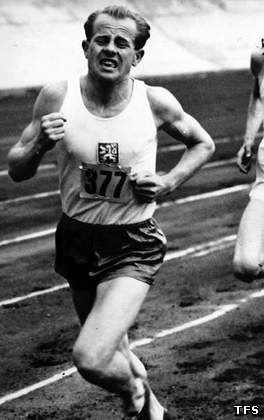
Zátopek attempted to defend his marathon gold medal in 1956; however, he suffered a groin injury while training and was hospitalized for six weeks. He resumed training the day after leaving the hospital and never quite regained his form, finishing sixth to his old rival and friend Alain Mimoun. He retired from competition in 1957.
Emil Zatopek threw everything into his running and this was reflected in his agonizing facial expressions. His running style was often criticized for being gangly, inefficient and unattractive, his head would often roll, face contorted with effort, while his torso swung from side to side, he often wheezed and panted audibly while running, which earned him the nicknames of "Emil the Terrible" or "the Czech Locomotive", but Zatopek retorted you don't win any prizes for looks in a running race. He ignored his critics and retained his unique style throughout his career. He says "It isn't gymnastics or figure skating, you know." , "I shall learn to have a better style once they start judging races according to their beauty. So long as it's a question of speed, then my attention will be directed to seeing how fast I can cover the ground."
Emil Zatopek was renowned for his hard training routines. He would train in any weather, including snow, and would often do so while wearing heavy work boots as opposed to special running shoes, and push himself through punishing training routines to get the best out of himself. He is said to have done 400 meters intervals up to 80 times in one training session. In many ways, Zatopek was a great pioneer of interval training. His philosophy was to develop speed and then be able to repeat this over a long period of time. Speaking of his intense training Zatopek said: "If one can stick to the training throughout the many long years, then will power is no longer a problem. It's raining? That doesn't matter. I am tired? That's beside the point. It's simply that I just have to." He was always willing to give advice to other runners. One example he often gave was to always be relaxed and to help ensure that while running, gently touch the tip of your thumb with the tip of your index or middle finger. Just making that slight contact would ensure that arms and shoulders remained relaxed.
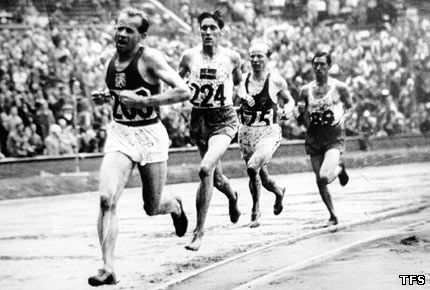 Emil Zatopek was a great Czech hero. He was also an important member of the Czech Communist party. But, he wasn't afraid to speak his mind. Before the Helsinki games in 1952, Zatopek protested at the exclusion of fellow athlete, Stains Jungwirth because his father was a political prisoner. Initially the Communist party refused to let either Jungwirth or Zatopek go the games. But, eventually they caved in and allowed both to go. It was an achievement that very few people other than Zatopek could have pulled off. However, he supported the party's democratic wing, and after the Prague Spring, when the revolution failed, Zatopek was punished by being removed as colonel in the army and was sent to work in an uranium mine - a fate he accepted for his willingness to speak out against the authorities. On the 9th of March 1990, Zátopek was rehabilitated by Václav Havel. Zátopek died in Prague, after a long illness, in 2000 at the age of 78. He was awarded the Pierre de Coubertin medal posthumously in December 2000. Zatopek is the only Olympic athlete whose statue appears at the Olympic Museum in Lausanne. Emil Zatopek was a great Czech hero. He was also an important member of the Czech Communist party. But, he wasn't afraid to speak his mind. Before the Helsinki games in 1952, Zatopek protested at the exclusion of fellow athlete, Stains Jungwirth because his father was a political prisoner. Initially the Communist party refused to let either Jungwirth or Zatopek go the games. But, eventually they caved in and allowed both to go. It was an achievement that very few people other than Zatopek could have pulled off. However, he supported the party's democratic wing, and after the Prague Spring, when the revolution failed, Zatopek was punished by being removed as colonel in the army and was sent to work in an uranium mine - a fate he accepted for his willingness to speak out against the authorities. On the 9th of March 1990, Zátopek was rehabilitated by Václav Havel. Zátopek died in Prague, after a long illness, in 2000 at the age of 78. He was awarded the Pierre de Coubertin medal posthumously in December 2000. Zatopek is the only Olympic athlete whose statue appears at the Olympic Museum in Lausanne. 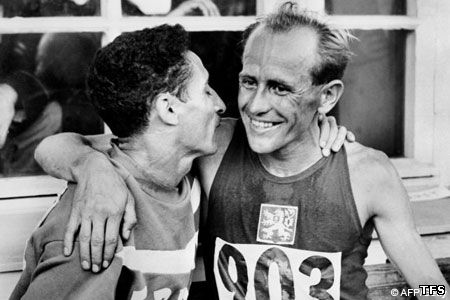
As well as being a great runner, Emil was legendary for his generous heart and good nature. The great Australian runner Ron Clarke had achieved many spectacular achievement in athletics, but, an Olympic gold had always eluded him. When Ron Clarke went to visit Zatopek, Zatopek accompanied him to the airport. At the last moment, Zatopek thrust something into his hand. Clarke thought it might be some secret document, but, when he got on the plane he was shocked to see an Olympic gold medal with a note from Zatopek saying simply 'Because you deserve it'. Clarke said: "I do know no-one cherishes any gift more than I do, my only Olympic gold medal, and not because of what it is, but because of the man whose spirit it represents".
Zatopek had tremendous sincerity. He recounts arriving at the 1948 Olympics in London: "It was my first competition in Olympic Games and I was surprised to come to Olympic stadium and to read most important things about the Games: 'Not to win but to take part'. What—not to win? Ah, but I wish to win! "
Zatopek also remarked on how significant the 1948 Olympics were: "For me, the 1948 Olympics was a liberation of the spirit. After all those dark days of the war, the bombing, the killing, the starvation, the revival of the Olympics was as if the sun had come out. I went into the Olympic Village in 1948 and suddenly there were no more frontiers, no more barriers. Just the people meeting together. It was wonderfully warm. Men and women who had lost five years of life were back again."
He was married to Dana they were born on the same day: September 19, 1922 only 6 hours separated their birth and they remained close throughout their lives.Dana was also a great athlete in her own right winning a gold in the javelin in 1952 Summer Olympics - only a few moments after Emil's victory in the 5 km run - and the silver medal in the 1960 Summer Olympics. An example of the playful relationship between husband and wife came when Emil attempted to take some credit for his wife's Olympic victory at her press conference, claiming that it was his victory in the 5 km run that had "inspired" her. Dana's indignant response was, "Really? Okay, go inspire some other girl and see if she throws a javelin fifty meters!!" Emil and Dana were the witnesses at the wedding ceremony of Olympic gold medalists Olga Fikotová and Harold Connolly in Prague in 1957. Emil had spoken to the Czechoslovak president Antonín Zápotocký to request help in getting Olga a permit to marry Connolly. While it's not clear how much this helped, they surprisingly received a permit a few days later.
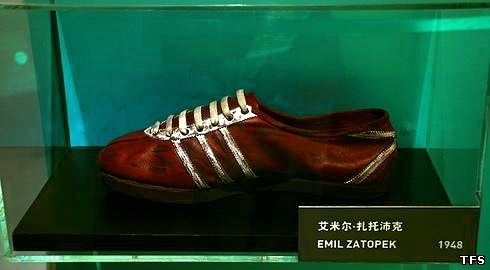 Emil's Shoes
Quotes:
-Great is the victory, but the friendship is all the greater.
-There is a great advantage in training under unfavorable conditions. It is better to train under bad conditions, for the difference is then a tremendous relief in a race.
-If you want to win something, run 100 meters. If you want to experience something, run a marathon.
-Why should I practice running slow? I already know how to run slow. I want to learn to run fast.
-When a person trains once, nothing happens. When a person forces himself to do a thing a hundred or a thousand times, then he certainly has developed in more ways than physical. Is it raining? That doesn't matter. Am I tired? That doesn't matter, either. Then willpower will be no problem.
-A runner must run with dreams in his heart, not money in his pocket.
-What has passed is already finished with. What I find more interesting is what is still to come.
-We forget our bodies to the benefit of mechanical leisure. We act continuously with our brain, but we no longer use our bodies, our limbs. It is the Africans who possess this vitality, this muscular youth, this thirst for physical action which we are lacking. We have a magnificent motor at our disposal, but we no longer know how to use it.
-You can't climb up to the second floor without a ladder....When you set your aim too high and don't fulfill it, then your enthusiasm turns to bitterness. Try for a goal that's reasonable, and then gradually raise it.
-After all those dark days of the war, the bombing, the killing, the starvation, the revival of the Olympics was as if the sun had come out....I went into the Olympic Village and suddenly there were no more frontiers, no more barriers. Just the people meeting together. It was wonderfully warm. Men and women who had just lost five years of life were back again. - Emil Zatopek, about the 1948 London Olympics.
-I was unable to walk for a whole week after that, so much did the race take out of me. But it was the most pleasant exhaustion I have ever known. - after winning marathon in 1952
-If you come to think of it, you never see deer, dogs and rabbits worrying about their menus and yet they run much faster than humans.
-When I was young, I was too slow. I thought I must learn to run fast by practicing to run fast, so I ran 100 meters fast 20 times. Then I came back, slow,slow,slow. People said, 'Emil, you are crazy. You are training like a sprinter.'
-Everyone said, 'Emil, you are a fool!' But when I first won the European Championship, they said: 'Emil, you are a genius!' - Emil Zatopek on Interval Training.
-He does everything wrong but win.
|

